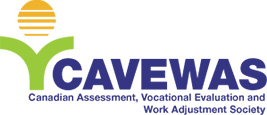Parameters, Categories & Credentials
 To become a member of CAVEWAS, one joins the Vocational Rehabilitation Association of Canada and indicates, during registration, that they wish to be a member of CAVEWAS as well. This is an indication of preference that provides you with additional benefits associated with Assessment, Vocational Evaluation and Work Adjustment (Career Development, Employment Services, Job Readiness, Job Development and Placement) at no extra cost.
To become a member of CAVEWAS, one joins the Vocational Rehabilitation Association of Canada and indicates, during registration, that they wish to be a member of CAVEWAS as well. This is an indication of preference that provides you with additional benefits associated with Assessment, Vocational Evaluation and Work Adjustment (Career Development, Employment Services, Job Readiness, Job Development and Placement) at no extra cost.
Domains of Practice
If you require knowledge and skill in any of the following domains of practice, you might be interested in joining your colleagues as a CAVEWAS member:
- Foundation of Vocational Evaluation
- Principles of Vocational Evaluation
- Assessments – Standardized or Other
- Transferable Skill / Employability Analysis
- Occupational Information
- Ethics
- Disability
- Communication
Categories of Membership
Your category of membership with CAVEWAS is consistent with your VRA membership status:
Professional
A member who has paid the prescribed fee and is actively engaged in the practice of some aspect of assessment, vocational evaluation or work adjustment. A Professional member shall have the right to serve on the Board of Directors and vote at the annual or special meetings of the Society.
Student
A member who has paid the prescribed fee and is interested in, and supportive of, the objectives of the Society. A Student member shall not have the right to serve on the Board of Directors or vote at the annual or special meetings of the Society.
Associate
A member who has paid the prescribed fee and is interested in, and supportive of, the objectives of the Society. An Associate member shall have the right to serve on the Board of Directors and vote at the annual or special meetings of the Society
Fellow
An individual who has been granted the Fellowship of the Association (FVRAC – previously FCARP) by the VRA Board, in accordance with policies established by the Board from time to time, in recognition of the distinctive and exceptional achievements of such individual in the field of rehabilitation.
 CAVEWAS Specific Credentials
CAVEWAS Specific Credentials
Registered Vocational Professional (RVP)
In collaboration with VRA Canada, CAVEWAS developed and supports the RVP. This registration process is an effective means of communicating to the person receiving services, to payers, and to industry agencies that members have achieved and demonstrated a recognized level of professional competence in the field of vocational / rehabilitation.
The RVP Scope of Practice includes the use of the following competencies as an independent consultant or as an employee of an agency, organization or company:
- Helping and communicating during client interactions
- Facilitating career processes
- Remaining current with and sharing labour market and occupational information and trends
- Assisting clients in finding and using current vocational resources
- Comprehending and effectively using career development resources
- Adapting vocational services to meet the needs of various groups
- Following and understanding the ethical standards of VRA Canada including client rights and professional responsibilities
- Knowing current legislation and regulations affecting vocational service provision
- Understanding career development programs
- Understanding and applying career development models and techniques
- Maintaining competence in job search strategies and placement techniques
- Preparing and delivering materials for training programs and presentations on how to access career information and how to effectively prepare for a job
- Working as a liaison in collaborative relationships with rehabilitation counsellors, vocational evaluators, and other professionals
- Understanding the terms of reference of the National Occupational Classification Handbook
- Understanding physical / functional and vocational assessments and their roles.
The decision to grant the RVP designation is based on a careful review and evaluation of the applicant’s education, employment experience directly related to the vocational / employment services field, and references from peers and supervisor. Although the CAVEWAS Board of Directors is responsible for approving policies and procedures for approval process—and therefore the integrity of the review process—the authority for granting the designation is given to the VRA National Registration Review Committee, a sub-committee of the National Standards and Credentials Committee of VRA Canada. The Review Committee is comprised of professional members of the society who have extensive vocational / employment experience in either the public, private, or non-profit sectors.
Maintenance of the RVP requires a member to be in good standing and current with the VRA / CAVEWAS. The member must also complete 100 Continuous Educational Units (CEU) every 5 years.
For further details or to apply for the RVP, please click here.
Canadian Certified Vocational Evaluator (CCVE)
In 2015, the Canadian Assessment, Vocational Evaluation and Work Adjustment Association (CAVEWAS), a Society of the Vocational Rehabilitation Association of Canada (VRA), collaborated with the College of Vocational Rehabilitation Professionals (CVRP) to create a new designation in the Canadian market. This credential is the Canadian Certified Vocational Evaluator (CCVE). It had a predecessor in North America, the Certified Vocational Evaluator (CVE), initially supported by the Commission on Certification in Vocational Evaluation and Work Adjustment (CCWAVES). When CCWAVES terminated business, the Commission on Rehabilitation Counselor Certification (CRCC) took on the CVE designation but no longer offered a Canadian exam. This series of events encouraged CAVEWAS and CVRP to consider the CCVE as a Canadian alternative.
A group of highly skilled and experienced individuals in Vocational Evaluation and / or in Professional exam development, representing CAVEWAS and CVRP, met several times and worked together to develop the CCVE application process and exam. KMG Health Partners won the rights to develop the CCVE Study Guide and Exam Preparation Workshop through a request for proposal process.
The following domains form the basis of the Study Guide and exam:
|
|
The first CCVE workshop took place on May 7, 2016, with excellent feedback. The first sitting of the CCVE exam was on May 8, 2016. Both the workshop and the exam took place in Toronto. 22 of the 26 participants passed the exam. Check the website calendar for future workshop and exam dates.
